Listen:
Check out all episodes on the My Favorite Mistake main page.
My guest for Episode #294 of the My Favorite Mistake podcast is Mandolen Mull.
She has worked with global clients in various industries, helping organizations with change implementation and leader development training. The daughter of a master stone mason entrepreneur, Mandolen has a great appreciation for the responsibility of leaders in building trades and manufacturing realms.
Mandolen has written a leadership handbook and is currently publishing her multi-series memoir titled Mullings, Mullivation, and MullMentum.
She was born in Fort Worth, TX, and inspired by her family's history in politics, she obtained a bachelor's degree in Political Science & Psychology and an MBA in International Business at McLane College of Business from the University of Mary Hardin-Baylor.
Amassing over a decade of corporate leadership experience, she obtained her Ph.D. from the Soules College of Business at the University of Texas at Tyler in Organizational Development & Change.
In this episode, we explore powerful leadership lessons drawn from personal experiences, including the importance of authenticity and earning credibility in challenging environments. Mandolen shares a defining moment early in her career when she stepped into a male-dominated workplace and made an impulsive decision that led to a valuable lesson about humility and resilience. She reflects on how listening, observing, and building trust with her team helped her become an effective leader, emphasizing that leadership is not about asserting authority but about connecting with people and addressing their needs.
We also delve into the impact of adversity on her leadership journey, including her experience with dystonia and how it shaped her perspective on resilience and empathy. Mandolen discusses the inspiration behind her memoir series, including themes of grit, transformation, and navigating complex relationships. Through candid stories about her personal and professional life, she offers insights into building trust, overcoming challenges, and fostering a leadership style that prioritizes connection, transparency, and growth.
Questions and Topics:
- Can you share an update on your memoir series? What themes are you exploring in these books?
- What’s the story behind your favorite mistake, and what leadership lessons did you take from it?
- Was your initial approach to listening and observing natural for you, or did someone advise you to take that approach?
- How did your father’s lessons and perspective shape your leadership style?
- What advice did your father give you to help overcome challenges in leadership?
- How did your team’s feedback inspire your transition to becoming a professor?
- What is it like coaching ironworkers to become effective leaders and instructors?
- How has your experience with dystonia and other health challenges influenced your leadership journey?
- What inspired the title and concept of your first book, Grit for the Pearl?
- What are the key themes of your upcoming books, and how do they connect to your life and work?
Scroll down to find:
- Video version of the episode
- How to subscribe
- Quotes
- Full transcript
Find Mandolen on social media:
Video of the Episode:
Quotes:
Click on an image for a larger view
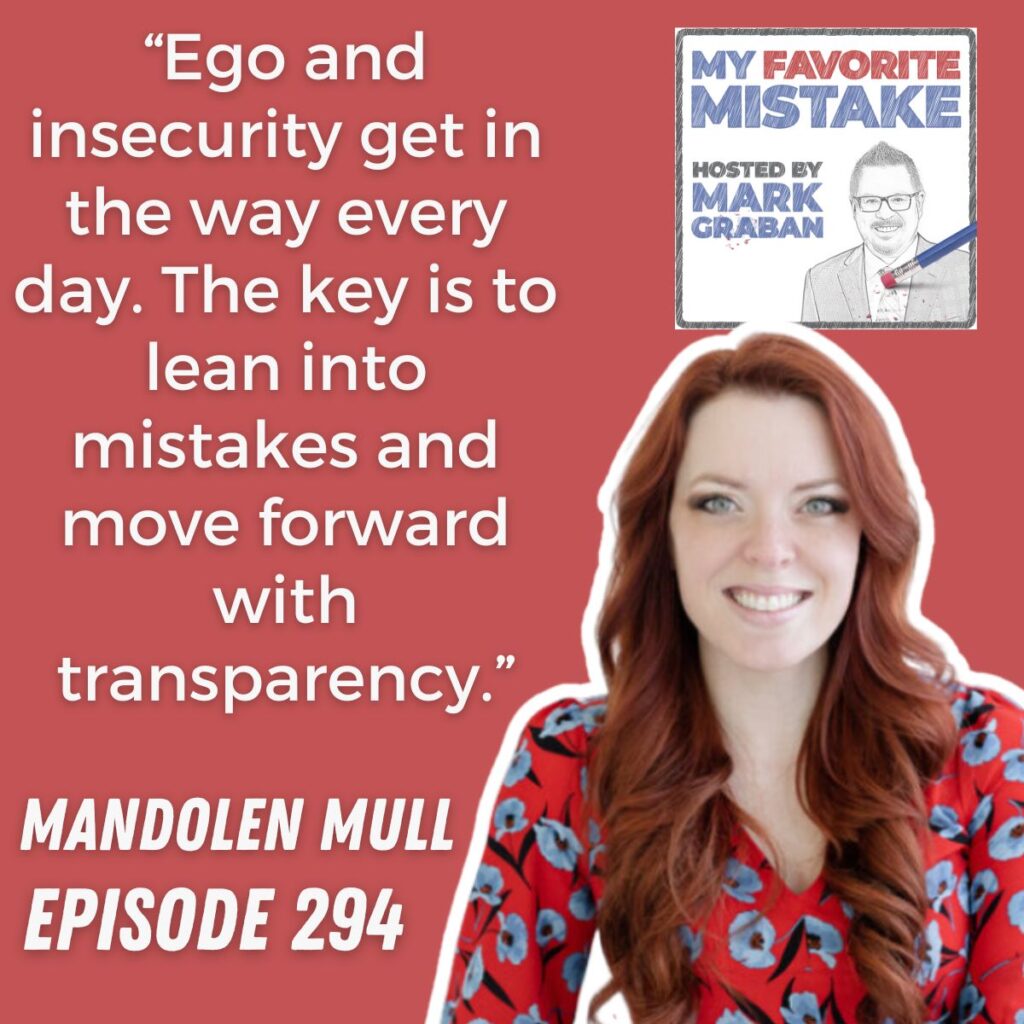
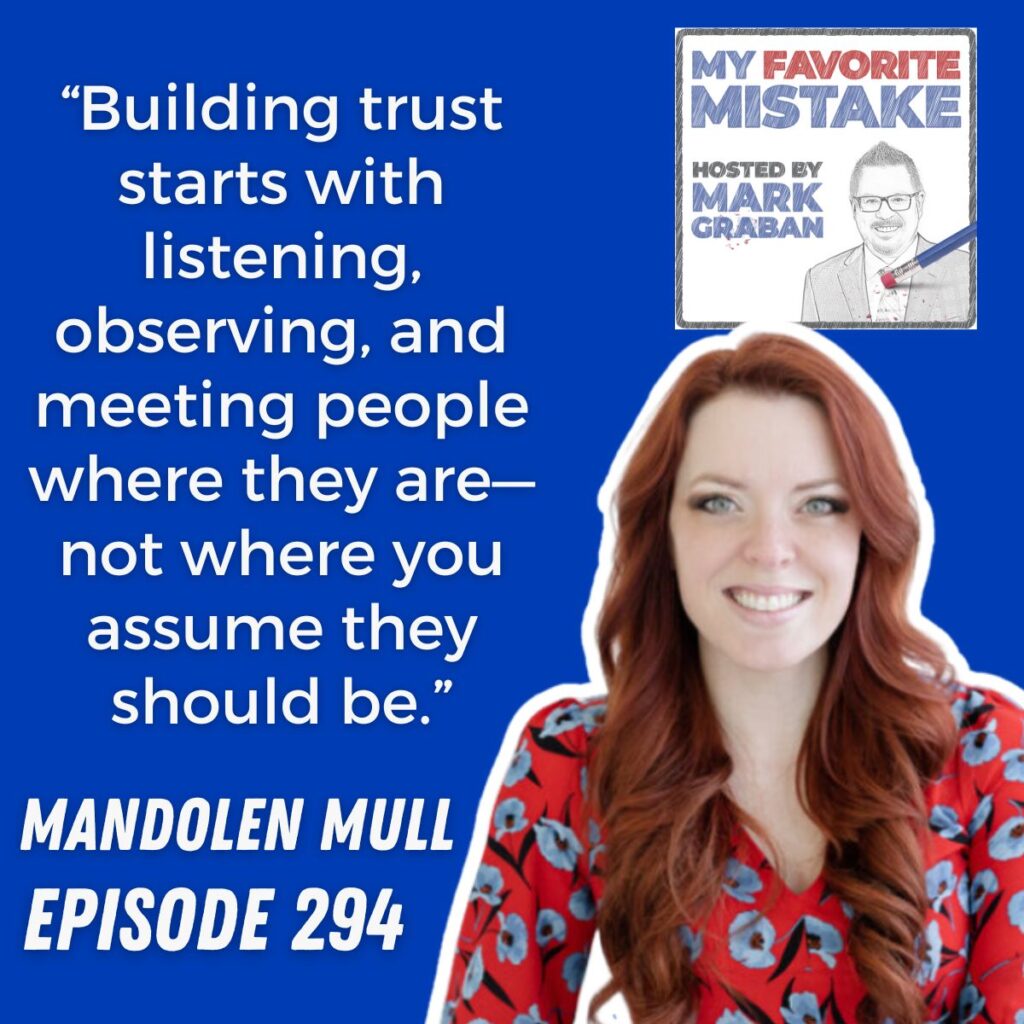
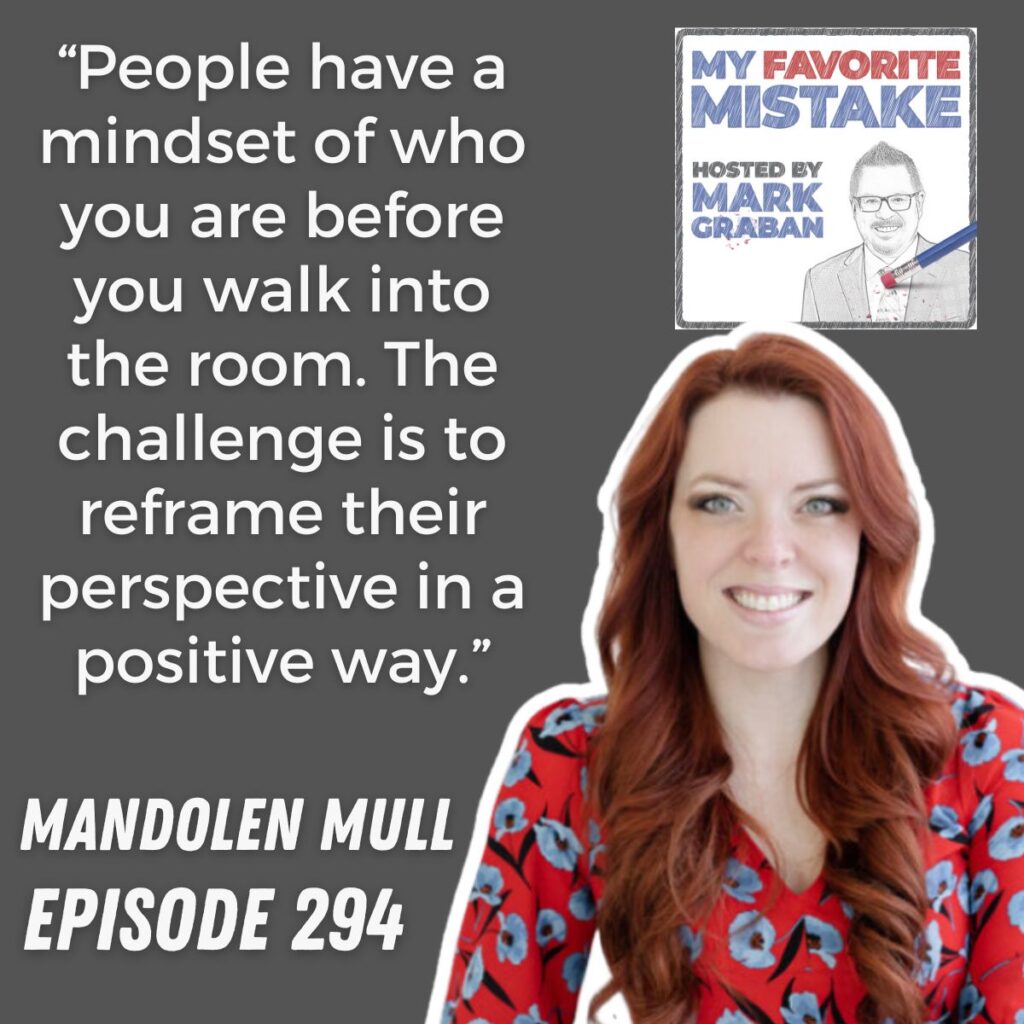
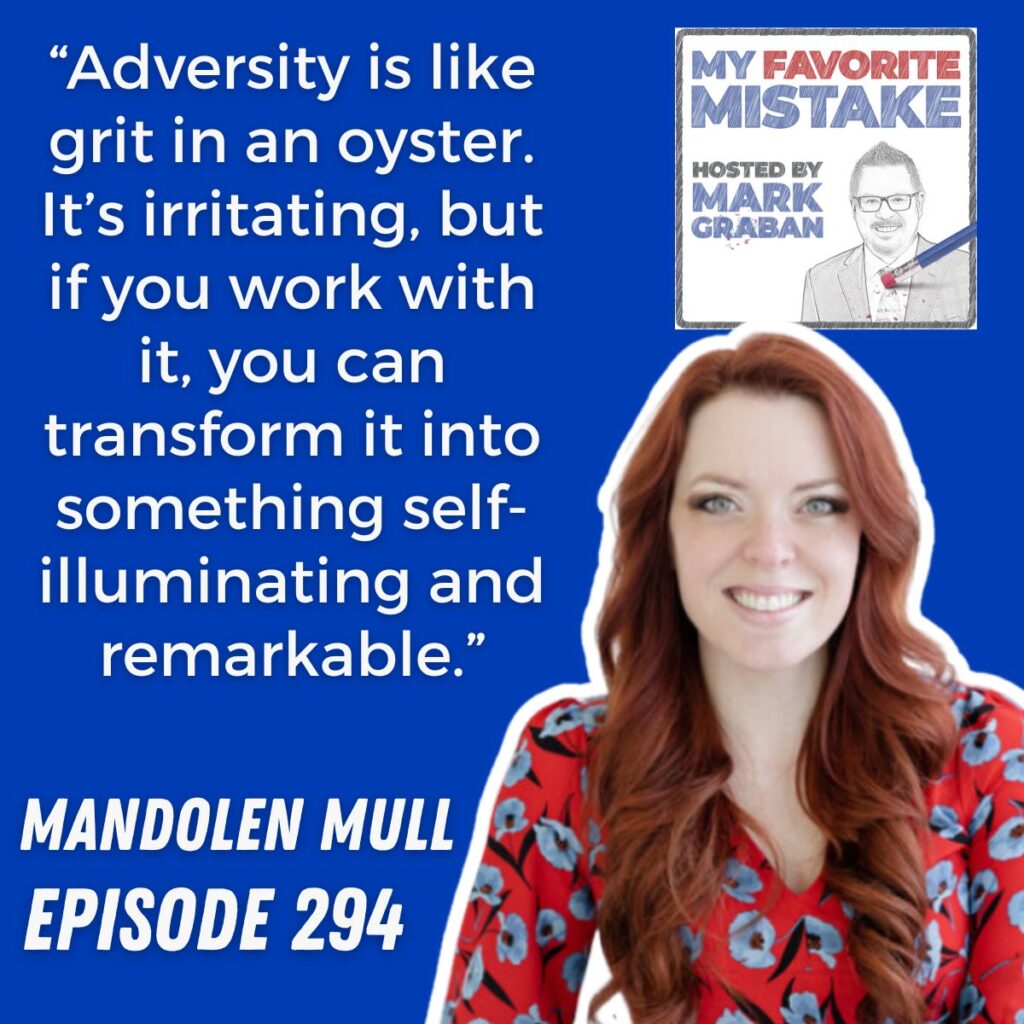
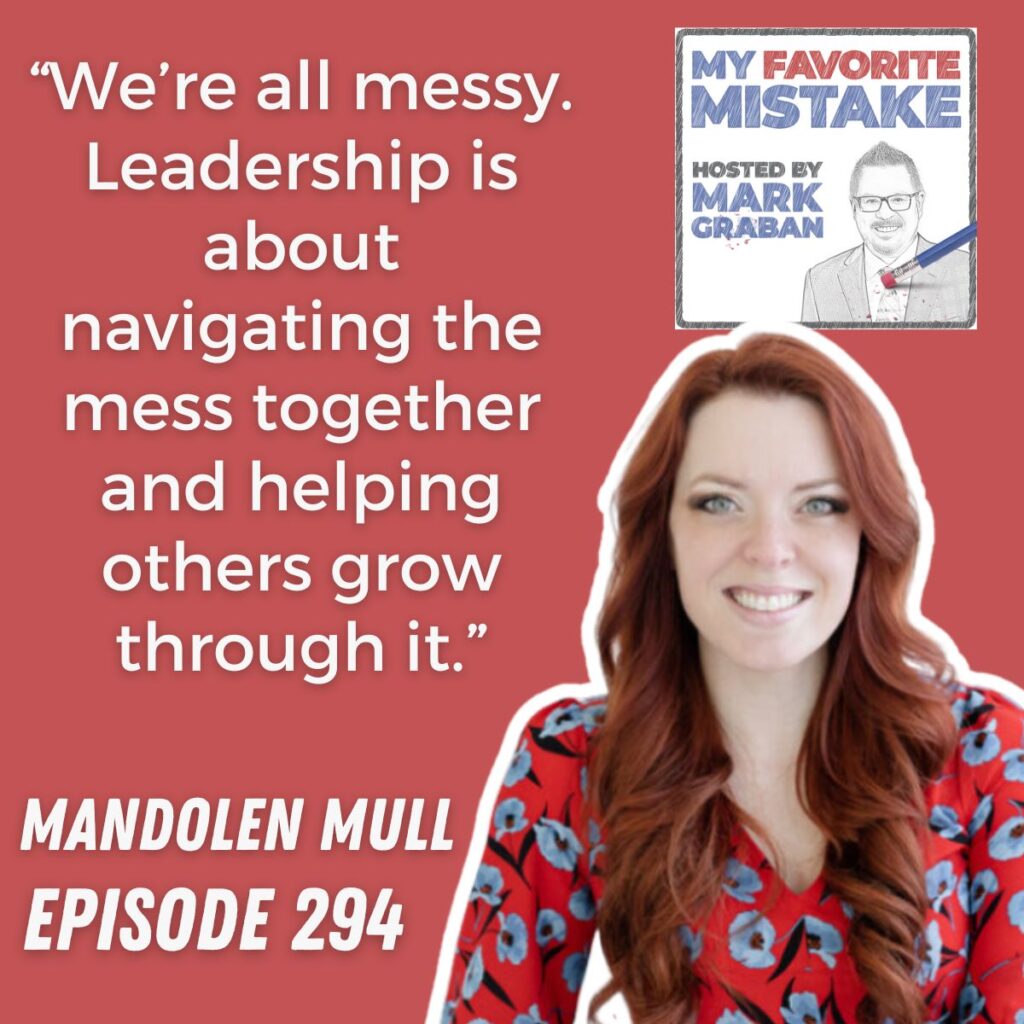
Subscribe, Follow, Support, Rate, and Review!
Please follow, rate, and review via Apple Podcasts, Podchaser, or your favorite app — that helps others find this content, and you'll be sure to get future episodes as they are released weekly. You can also financially support the show through Spotify.
You can now sign up to get new episodes via email, to make sure you don't miss an episode.
This podcast is part of the Lean Communicators network.

Other Ways to Subscribe or Follow — Apps & Email
Automated Transcript (May Contain Mistakes)
Mark Graban:
Hi, welcome to My Favorite Mistake. I'm your host, Mark Graban, and our guest today is Mandolen Mull. She was born in Fort Worth, Texas. Inspired by her family's history and politics, she obtained a bachelor's degree in Political Science and Psychology and an MBA in International Business at the University of Mary Hardin Baylor. What's that? For those who aren't watching, what's the hand sign? Is that a Baylor Bear?
Mandolen Mull:
No, it's a Mary Hardin Baylor Crusader. You’ve got to throw up your Cs for the Crusaders.
Mark Graban:
For the Crusaders. And Mary Hardin Baylor is not affiliated with Baylor University, right? I made a mistake, Mandolen.
Mandolen Mull:
We are the original Baylor. We were the all-girls school of Baylor. We are very proud of that. We tend to not like that other school in Waco. So yeah, we're pretty proud of being the oldest school west of the Mississippi.
Mark Graban:
Okay, well, thank you for clarifying that. A little more about her career: after a decade of corporate leadership experience, she then earned her PhD from the University of Texas at Tyler in Organizational Development and Change. I know we'll be talking about that later in the episode. She’s worked with global clients in a wide range of industries, helping leaders and organizations with change implementation, leadership development, and training. She’s also the daughter of a master stonemason and an entrepreneur, which gives her a great appreciation for leadership in the building trades and manufacturing. Mandolen has written a leadership handbook and is currently publishing her multi-series memoir titled Mullings, Mullivation, and Mulmentum. Oh, I stumbled over that. But welcome, welcome to the podcast.
Mandolen Mull:
Mark, thank you so much. I've really been looking forward to chatting with you, and I’m thrilled to have this discussion with you today.
Mark Graban:
Yeah, well, thank you. It's great to have you here. We talked a couple of months back in preparation for this. Is your memoir still in the publishing phase? I should have asked you for an update.
Mandolen Mull:
Right. I published the first one, Grit for the Pearl. That just came out in August. The next one is My Heart Sits With Yours. It’s about my stonemason father as well as the complexities of relationships. I’m really looking forward to that one coming out. It’s been a little harder for me to write the preface for because I’m dedicating it to some ironworkers I’ve really bonded with. And we just keep rolling; we’ve got at least three more in the series.
Mark Graban:
Oh, wow. I’ll make sure there are accurate links in the show notes to your books and your company page. That name, Mulmentum. I said it better that second time. So, Mandolen, I’m curious, as always, to start with our core question: what’s your favorite mistake?
Mandolen Mull:
Oh, my gosh. Okay, so my favorite mistake is when I graduated with my MBA from the McLane College of Business at Mary Hardin Baylor, the original Baylor. I got an opportunity to go work at McLane Company, a large grocery distribution company all across North America.
So, I walk into this 116-degree warehouse. It was the flagship location of McLane, and I had been identified as a hi-po—a high potential. They wanted me to get a year’s worth of operations experience in the warehouse and then move up within the organization.
So, I walk into this warehouse, 116 degrees. I was the first female to oversee the loading dock, which was 160 men. I walk in with my dress, my high heels, and my pearls, and my nickname—I later found out—was “Degree.” Here I was with this MBA, and they were like, “Oh, we’ve got this new little supervisor.” I’m 4 foot 11 and about a buck 10 is my fighting weight.
So, I walk in and I knew these guys weren’t going to buy into me. It took me about a week of just shutting my mouth and listening. On the last day of that week, my colleague introduced me to all of our team. We had the first shift and the second shift gathered together. He said, “This is Ms. Mandolen. She’s going to be your new supervisor. Over the next several weeks, we’ll introduce her to how we load these big giant trucks. But today, we’re going to show her how we do Push-Up Friday.”
And without thinking, I had a moment of insanity and said, “Oh, this is where I show you up in front of all my guys.” You could’ve heard a pin drop. Everybody in that warehouse was like, “What did she just say?”
So, my colleague says, “Okay, let’s do this.” We all get down on the dusty warehouse floor, and I start doing push-ups. What I didn’t know was that my colleague used to be a drill sergeant. He starts with the, “Down. Up. Down. One.” I’m thinking, “That’s three push-ups, bro. You don’t know how to count!” I did three push-ups to his thousand—or what felt like it. I just stayed in the plank position, thinking, “Do not let your knees touch this ground. Your daddy will find you and shame you.”
I was shaking and watching other men fall over after doing 20 or 50 push-ups. Finally, my colleague said, “Let’s give Ms. Mandolen a round of applause.” I said, “No, no, no, let’s not. But clearly, I have some work to do. I’m going to come in early every Friday and do push-ups with you. It’s going to take me a while to get as good as you guys, but I’ll keep working at it, and we’ll make progress.”
As we walked away, my colleague said, “Mandolen, there’s not a person in this warehouse now who wouldn’t walk through fire for you. Nobody expected you to do that.”
Mandolen Mull:
I wish I could tell you that moment was planned. I wish I could tell you I had intended to do that. But it was just my personality, and somehow, it earned me credibility in a way I never expected. After that, some of the guys would see me in the break room and say, “22, what’s up?” I was really proud of myself for that.
Looking back, that impulsive moment of boasting, “I’ll show you up,” was a massive mistake. I ran my mouth and couldn’t back it up, and it was embarrassing. But what kept me going, honestly, was my ego. I didn’t want word to get back to my father that I’d walked into that warehouse, talked a big game, and couldn’t deliver. That fear drove me to push through.
Mark Graban:
So, if I’m understanding correctly, the mistake was that impulsive boasting, but at least you managed to recover from it. Is that right?
Mandolen Mull:
That’s absolutely right, Mark. My authenticity came out when I said, “Hey, I’m really embarrassed that happened. Let me make it right going forward.” I didn’t realize at the time what a significant lesson I was learning about credibility and trust.
Mark Graban:
There’s something powerful about acknowledging a mistake and saying, “Here’s how I’ll make it right.” It feels like a valuable leadership lesson.
Mandolen Mull:
Absolutely. Ego and insecurity get in the way every day, sometimes multiple times a day. It’s easy to get hijacked by embarrassment and try to cover up mistakes. In my case, I couldn’t hide it—it was very apparent. So, I leaned into it and said, “Let’s move forward.” That transparency helped me grow as a leader.
Mark Graban:
Going into that situation, being the only woman in a male-dominated environment, I can’t personally relate. But I can relate to being a young college graduate in a factory environment where people assumed I didn’t belong. Was it your natural style to listen and observe, or did someone advise you to take that approach?
Mandolen Mull:
That’s a great question. I’ve always been the youngest on the teams I’ve led, so I learned early on that listening was critical. In all my career, I’ve only had about three months where I wasn’t overseeing employees.
Mandolen Mull:
From the start of my career, I was responsible for looking out for other people. Because my father was a master stonemason and an entrepreneur, I took that responsibility seriously. I knew that if I couldn’t reach the people I led, I couldn’t teach them, support them, or advocate for them. Building a bond was essential. To do that, I had to show that I wasn’t a threat and that I genuinely cared about them.
That meant I had to observe, listen, and understand their pain points instead of going in with assumptions. I had to meet them where they were and help them grow from there. That approach has evolved over time, but much of it was inspired by my father’s teachings.
Mark Graban:
How much did you talk to your father about that position and its challenges? I imagine he gave you advice to help you succeed.
Mandolen Mull:
We talked a lot. My father dropped out of high school to go to work, so my education was incredibly important to him. But he also warned me that my education could be seen as a detriment—just like my gender, age, or inexperience could be.
He was 5'7″ and scrappy, with a bit of Napoleon syndrome. He believed in being an underdog and surprising people. He taught me to reframe people’s perceptions and show them my heart, so they’d see I genuinely wanted to help. He emphasized removing the trappings of titles and connecting on a human level.
Mark Graban:
It sounds like they realized pretty quickly that you weren’t just punching your ticket before moving to a cushy office job.
Mandolen Mull:
Exactly. When I eventually left McLane after a year, it wasn’t because I failed—it was because the employees I mentored to backfill my position encouraged me to pursue teaching. They brought me a job description for a professor role at Tarleton State University and said, “You’ve helped us so much with our career development. We think you’d be a great professor.”
Mandolen Mull:
That moment changed my life. I became a professor teaching adult learners, which has always been a passion of mine. Many of my students were from manufacturing or building trades, and for the past eight years, I’ve also been training union ironworkers. It’s been incredible to work with these folks—helping them grow as leaders, instructors, and mentors on job sites and in training facilities.
Mark Graban:
Are you coaching ironworkers to become supervisors or leaders within their trades?
Mandolen Mull:
Yes. I work with ironworkers who are instructors in classrooms, supervisors on job sites, training facility managers, district presidents, and more. It’s some of the most fun and rewarding work I’ve ever done. There’s a strong sense of pride and generational mentorship within their trade—many of them are fourth-generation ironworkers.
You see this embedded pride and culture that’s unique to trades like theirs. They never truly escape the work; it’s part of their identity. That’s why it’s so important to embed sustainable leadership development in their training, focusing not just on technical skills but also on legacy-building, addressing ego, and fostering resilience.
Mark Graban:
You mentioned earlier that you’ve experienced dystonia, and it seems like that’s been a significant part of your journey. How has that influenced your leadership and life perspective?
Mandolen Mull:
Eight years ago, I developed acquired torsion dystonia. It caused severe muscle contractions, and doctors told me I’d be severely deformed within five years. I couldn’t walk or talk properly and needed a cane at one point. But I refused to accept that fate—I was in the middle of pursuing my PhD, and giving up wasn’t an option.
Through therapy, medications, and stress management, I’ve been able to regain much of my functionality. The accent you hear today is a result of the dystonia, and while it’s unusual, I embrace it. Sharing my story has been meaningful because it’s helped others. One of my former students who was diagnosed with dystonia said, “I wasn’t afraid when the doctor told me because I knew you had it, and I knew I wasn’t alone.”
Mark Graban:
That’s an inspiring story, Mandolen. You’ve turned a difficult experience into a way to help others feel less isolated.
Mandolen Mull:
Thank you, Mark. It’s not always easy to talk about these things, but I believe we go through challenges for a reason. If sharing my story can bring comfort to someone else, it’s worth it. When I was first diagnosed, I didn’t know anyone with dystonia or Crohn’s disease. That isolation was tough. Now, I try to ensure others know they’re not alone.
Mark Graban:
Let’s talk about your book, Grit for the Pearl. The title brings up imagery of transforming adversity into something beautiful. Is that a fair way to describe it?
Mandolen Mull:
Absolutely. I write about my health issues, a late-term miscarriage, and traumatic surgeries that sterilized me, as well as how I continued to find success in my career. The title comes from two sources. My grandmother used to say, “There’s nothing a good pair of pearls and perfume can’t fix.” And I wanted to contrast the idea of grinding adversity into diamonds. Instead, I prefer the pearl metaphor—something irritating or abrasive that you work with to create something self-illuminating and remarkable.
Mark Graban:
It’s such a beautiful concept. What can readers expect from your future books in the series?
Mandolen Mull:
The next one, My Heart Sits With Yours, is deeply personal. It’s about the complexities of my relationship with my father, who had his flaws but also taught me valuable lessons about love and leadership. The third book, Batten Down the Lashes, explores the family I’ve built through work and mentorship. The fourth, Haven and Harbor, shares my journey of becoming an unexpected foster mom. The fifth book will be another leadership book based on my experiences.
Mark Graban:
That sounds like a powerful series. Thank you for sharing your insights, experiences, and stories with us. And thank you to our mutual friend, Kyle Kampf, for recommending you as a guest.
Mandolen Mull:
Thank you so much, Mark. And yes, Kyle is incredible. It’s been an honor to be on your podcast.

